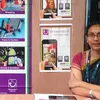With PaySense, this woman entrepreneur wants to make credit accessible to every individual
As Co-founder of PaySense, a fintech startup based in Mumbai, Sayali Karanjkar is striving to make credit accessible and affordable to all.
When Sayali Karanjkar decided to return to India from the US to start up in the fintech space, she felt a lot of research was in order before she started PaySense.
She spent a few months talking to various people – from sabzi vendors, rickshawallahs, house help, small shop owners, and employees of non-top tier companies. She realised that everyone was having a tough time getting access to finance.

“Not having access to finance is one of the big things that bring a family from middle class to poverty or close. It just takes one major roadblock such as a medical incident or major home breakage or unplanned educational or small business bets to damage an entire family’s future,” she explains.
“Many of these conversations touched me deeply. I still remember a young woman working in a reputed company but had been denied a credit card as well as a personal loan. She had no idea why. She had no one to go to for advice; she was the first person in her family to get a college degree and a formal job. I was talking to her and she said to me in the sincerest manner possible, ‘But I am a good person’,” Sayali adds.
Making access to credit easier
This led Sayali to research further about women and their banking requirements. She accompanied her house help and cook to the nearby PSU as well as a large private bank and found they hardly received any attention there.
“This experience really irked me. I went to large banks dressing up differently each time and had the first-hand experience of biases when it comes to credit. The treatment given to women is vastly different, much more inferior to men who are always assumed to be the decision maker in finances, and are driven by personal biases versus the data that the woman's bank account holds,” she says.
After completing her undergraduate studies in the National University of Singapore, Sayali worked in Sun Microsystems for a year before moving to the US where she had a stint at AT&T, the went to the Kellogg School of Management for her MBA and later worked in AT Kearney, Chicago before she returned to India.
After she moved to India, Sayali says she was NTC (new to credit) and could not get any credit instrument at all. “Even with data such as bank balance or salary slips from my job in India, it was difficult to get one. I then found through informal sources that most of the credit in India is unstructured. These credit options are usually incredibly expensive and very risky. Credit cards had very low penetration too, and still do,” she says.
She found that even though credit is a huge enabler, access to it is very difficult. And because of this, people were shelving their aspirations, whether it was air-conditioning for family, a foreign trip, home renovations, a laptop, etc.
Sayali met her co-founder, Prashanth Ranganathan, in early 2015 as he was laying the groundwork for his fintech venture. The two joined hands and PaySense started operations and lending around May 2016.
Paysense, Sayali notes, is all about making credit accessible and affordable to all.
“We want everyone in India to have access to this opportunity to improve their lives. To that end, we have built proprietary models that allow us to use various data points to make decisions and thus serve a far wider population, even if they have no credit history or traditional salaried jobs. The credit models work on data only and not on personal biases. There are no biases in the Paysense experience. Women will not be treated differently or asked for anything more or different like, ‘please can you also bring your husband/father’,” she adds.
PaySense EMI, its personalised line of credit, is similar to a personal loan and can be used to make instant purchases, whether online or offline, through affordable EMI plans. The upper limit of credit disbursed is Rs 5 lakh. In July 2018, Naspers-backed PayU made an investment of $11.5 million in PaySense as part of a Series B funding round of $18 million.
Existing investors Jungle Ventures and Nexus Venture Partners also participated in the round. PaySense secured its Series A round of $5.3 million from Jungle Ventures. The Series A round also saw participation from Naspers Group and existing investor Nexus Venture Partners.
Women and finance
When it comes to credit and finance, most Indian women leave it to the men to take the decisions. What has Sayali’s experience been with women and finance?
“It depends on whether it is by choice. Partners in a marriage may split up their roles and responsibilities in ways that work best for them, and this might be done harmoniously where both their needs and goals are taken into consideration. In this kind of division, while the management of family finances may be held by one partner, an important area is that the other partner has access and independence and is able to live comfortably and take care of dependents in case the responsible partner is not around,” she says.
She also adds that the problem arises when it is not by choice, or not due to lack of financial education. “We need to all work on educating and empowering women to be able to undertake these responsibilities. The parents, spouses, and all of us in the larger ecosystem all need to play a part.”
Highs and lows
Sayali feels encouraged and happy when other women feel inspired by her journey. “Another great moment was when a male colleague told me that working with me has helped him get over his personal biases about working with women.”
She does note that all is not hunky-dory yet. “The lows are when people make assumptions about women, and then all of us have to work harder and harder to prove them wrong. However, times are changing and we are seeing more women take the entrepreneurial plunge.”
But are women solo founders a rare breed, and do they need male co-founders to be taken seriously in the startup ecosystem?
“Women solo founders are definitely a rare breed but this is changing. I hope it changes faster so that there is equal probability of funding whether or not the founder is male or female. It requires deep thinking and careful consideration by everyone in the ecosystem, as biases can be overcome only with great self-awareness. There need to be more women in leadership positions across the startup ecosystem from angel, and advisors to investors and founders,” Sayali says.
As for the future, she wants to be able to help other women entrepreneurs realise their dreams. “As an advisor, angel, and personal mentor, I hope to make a difference in the ecosystem so we can see more and more women in leadership positions,” she says.
(Edited by Evelyn Ratnakumar)









